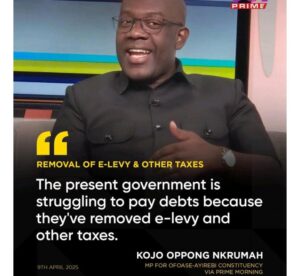Kojo Oppong Nkrumah Blames Removal of E-Levy for Ghana’s Debt Challenges
 Ghana’s economic conversation has taken center stage once again following a bold statement by former Information Minister Kojo Oppong Nkrumah. In a recent interview on Joy Prime the former minister blamed the removal of critical taxes—particularly the Electronic Transfer Levy (E-Levy)—for the government’s current struggle to manage the nation’s rising debt.
Ghana’s economic conversation has taken center stage once again following a bold statement by former Information Minister Kojo Oppong Nkrumah. In a recent interview on Joy Prime the former minister blamed the removal of critical taxes—particularly the Electronic Transfer Levy (E-Levy)—for the government’s current struggle to manage the nation’s rising debt.
Speaking candidly during the program, Oppong Nkrumah stated, The government is struggling to pay debts because they’ve removed E-Levy and other taxes. According to him these levies were not just policy instruments, but vital revenue-generating tools introduced by the previous administration to strengthen domestic finances and reduce reliance on external borrowing.
The E-Levy, introduced in 2022, placed a small tax on mobile money and electronic transactions. It was one of the most controversial fiscal measures in recent years, with critics arguing that it disproportionately affected the poor and hindered digital financial inclusion. Despite its unpopularity in some circles, Oppong Nkrumah insists that the levy played a crucial role in boosting revenue during a difficult economic period.
His remarks have sparked a fresh wave of political and public debate. Supporters of the former administration see his comment as validation of their fiscal strategy, while others argue that taxes like the E-Levy burden ordinary citizens and small businesses, potentially slowing economic activity in the long run.
Many analysts agree that Ghana’s debt issues stem from a combination of factors, including global economic pressures, overdependence on imports, and rising interest rates. However, the issue of domestic revenue mobilization remains at the heart of the conversation, with policymakers split over the best way to raise funds without overburdening citizens.
Oppong Nkrumah’s comments come at a time when the government is facing increasing pressure to stabilize the cedi, reduce inflation, and implement meaningful reforms. As Ghana continues to navigate these economic challenges, discussions around taxation, debt management, and development strategies are likely to remain in the national spotlight.
Whether the E-Levy was a necessary tool or a misstep in fiscal policy will continue to be debated. But what’s clear is that voices like Kojo Oppong Nkrumah’s are ensuring that the tough questions surrounding Ghana’s economic future are not being ignored.
